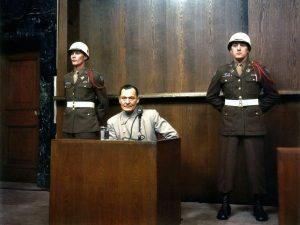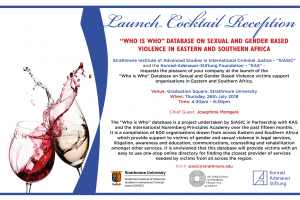75 Years since “Never Again”
Introduction
October 2021 marked exactly 75 years since a Court of law first punished individuals for their involvement in atrocities committed during conflict. On 1st October 1946, for the first time in history, a court gave its verdict, sentencing 25 Nazi men for German war crimes and crimes against humanity. These men were high-ranking political and military leaders of the German Third Reich. These prosecutions were later known as the Nuremberg Trials. How did we get here?
Let’s rewind to the fall of 1939, when the then “great” nations of the Earth declared war on each other. The radical nationalism and chest-thumping displayed by European Heads of States paved the way for the subsequent 60 months of brutal warfare, genocide and the consequential deaths of 50 million men, women and children. When the war finally came to an end in 1945, as a result of the unconditional surrenders of the Axis Powers, the nations of the world were appalled by the atrocities and the horrors of war, and they declared “Never again; never again should anything horrifyingly similar occur.”
In line with this, the victors of the war, the Allies, created the International Military Tribunal, and tasked it with the prosecution of key figures in the German war machinery. These individuals were to be prosecuted for crimes against Humanity, crimes against peace and war crimes. These trials marked the first time in history when the world unanimously agreed to prosecute individuals for International crimes.
 This, in many ways, was the birth of International Criminal Justice. The Tribunal established certain principles that are recognized as the fundamental pillars of International Criminal Law; for example, the abolishment of Head-of-State Immunity and the defence of Superior Orders.
This, in many ways, was the birth of International Criminal Justice. The Tribunal established certain principles that are recognized as the fundamental pillars of International Criminal Law; for example, the abolishment of Head-of-State Immunity and the defence of Superior Orders.
Critics of the Nuremberg Trials labelled the Trials as “Victor’s Justice” as the atrocities committed by the allies were never investigated or prosecuted. For example, no one was ever held responsible for the mass executions of 22,000 Polish intelligentsia at Katyn by the Soviet. Further, the Germans convicted at the Nuremberg trials did not have the right nor the capability of appealing their convictions.
That notwithstanding, the steady evolution of International Criminal Justice was neither halted nor delayed as evidenced by the adoption of the Geneva Conventions and the creation of the International Criminal Tribunal for Former Yugoslavia and its counterpart in Rwanda. The latest major result of the Nuremberg Tribunals is institutionalisation of ICJ by the establishment of the International Criminal Court (ICC) in 2002. The ICC is the world’s first permanent Court that has the power to investigate and prosecute International Crimes such as genocide, war crimes and crimes against humanity.
The “Situation in Africa”
The ICC has long been unpopular amongst modern-day African States. States like South Africa, Burundi, Gambia, and Kenya have threatened to withdraw from the ICC and its Rome Statute. Quite astonishingly, the African Union has supported these calls to withdraw. This lack of popularity can be attributed to a general feeling, particularly within the African political elite, that the ICC unequally enforces International Criminal Law, in that it actively targets African States inappropriately.
While the ICC ideally has universal jurisdiction, Africa is of the opinion that the Court has exercised its investigative and prosecutorial powers with geographic and racial selectivity. The ICC’s portfolio of achievements does little to counter this accusation. Of the 16 “Situations” that the Court has investigated, 10 are within the African continent. Additionally, every single one of the 30 individuals, on whom the prosecutorial power has been exercised, is African by race.
It is of course evident that African States are primarily receivers of International Criminal Law and not developers of international criminal law. African States were never actively involved in the evolution and development of international criminal law and jurisprudence. Scholars of Third World Approaches to International Law (TWAIL) have backed this allegation with two pieces of evidence. The first; ICJ is built on foundations of euro-centrism and hegemony. The Nuremberg Trials were seen as a statement that international law would not concern itself with atrocities, unless of course the victims are Europeans, or the atrocities are committed in Europe. It is important to keep in mind that the heinous atrocities committed by colonial powers in Africa on Africans were neither prosecuted nor did they receive world-wide attention or concern.
Secondly, the majority of African States received their independence in the middle of the Cold War, when consensus on international agreements was paralysed by suspicion and competition. This was the period in which ICJ was being developed.
In this vein, it is understandable that African States and Africans view the ICC as a disguised tool of western imperialism. TWAIL’ers have labelled ICL as an exportation of civilisation by the “civilised West” to Africa; “the uncivilised Continent”. Consequently, the ICC’s focus on Africa is a depiction of Africans as a people who are in need of saving from their chaos.
Conclusion
The crucial question to ask, as we mark the 75th Anniversary of the Nuremberg Trials, is whether international criminal justice has prevented “Never again” from happening again. While yes, we have not had another World War since 1945 (and fortunately I must add), violence and brutality have consistently persisted all over the world in the last 75 years. From war crimes in Syria, genocide in Biafra, and crimes against humanity in Myanmar, “never again” continues to happen.
References
- Stock L, ‘Third World Approaches to International Criminal Law (1/2) – The Origins of Modern International Criminal Law Exposed,’ AJSP, March 2021 {https://www.revuedesjuristesdesciencespo.com/index.php/2021/03/22/elementor-2574/}
- Zavis A and Dixon R, ‘Q&A: Only Africans have been tried at the court for the worst crimes on Earth,’ Los Angeles Times, October 2016.
- Fisher K, ‘ Africa’s role in the progression of International Criminal Justice; A moral and Political Argument,’ The Journal of Modern African Studies, December 2018.
- Maxwel M, ‘TWAILl’s Iconoclasim against the ICC Orthodoxy in Africa,’ Published LLM Thesis, Strathmore University, Nairobi, April 2017.
- United Nations, Principles of International Law Recognized in the Charter of the Nüremberg Tribunal and in the Judgment of the Tribunal 1950, 2005.
- Stock L, ‘Third World Approaches to International Criminal Law (1/2) –Structural and Material Bias at the International Criminal Court,’ AJSP, March 2021.{https://www.revuedesjuristesdesciencespo.com/index.php/2021/04/01/third-world-approaches-to-international-criminal-law-2-2-structural-and-material-bias-at-the-international-criminal-court/}



